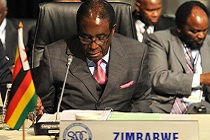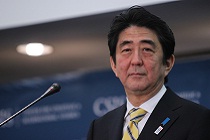India’s Liberal Agenda
This report examines whether traditional liberalism stands a chance in today’s India, where the individual’s role has been nearly subsumed by a dominant state seeking to be benefactor.
 Courtesy: Madhu Amodia
Courtesy: Madhu Amodia
This report examines whether traditional liberalism stands a chance in today’s India, where the individual’s role has been nearly subsumed by a dominant state seeking to be benefactor.
 Courtesy: bigbirdz/Flickr
Courtesy: bigbirdz/Flickr
We cannot have the ‘cowboy capitalism’ that almost brought down the world financial system in 2008, or the abdication of accountability by government institutions. Instead, both the private sector and the government must equally do their parts to create an equitable India to sustain economic growth for generations
 Courtesy: Semilla Luz/Flickr
Courtesy: Semilla Luz/Flickr
Though Brazil is a vibrant democracy, grievances over inadequate provision of public services and government overspending will not be resolved quickly due to the political disconnect with the needs of the people. Fernando Veloso blogs about the possible determinants and consequences of the protests
 Courtesy: GovernmentZA/Flickr
Courtesy: GovernmentZA/Flickr
The ZANU-PF party’s recent victory in the elections in Zimbabwe is fraught with allegations of manipulation. Reactions have varied, but South African President Jacob Zuma has endorsed the outcome. How will Mugabe’s re-election impact relations with South Africa? What will be the impact on Zimbabwe’s economy?
 Courtesy: CSIS/Flickr
Courtesy: CSIS/Flickr
After winning control of the legislature on July 21, Japanese Prime Minister Shinzo Abe has plans to alter the Constitution. In ways that could lead to a rearmed Japan, with a large defence force. What will be the consequences of this new face of Japan?
 Courtesy: World Economic Forum/Flickr
Courtesy: World Economic Forum/Flickr
Modi’s popularity within the business community has been based on the perception of his ability for good governance. However, instead of engaging in the complexity of identity politics, business leaders can undertake actions that build immunity against communal tensions
 Courtesy: oxfamnovib/Flickr
Courtesy: oxfamnovib/Flickr
Elections are meant to be a suitable recourse in democracies if citizens feel that the government does not represent them. However, the recent protests in Brazil, Turkey and India show that people feel political classes are too far removed from their every day realities to address their grievances
 Courtesy: Jacques Delarue/Wikimedia Commons
Courtesy: Jacques Delarue/Wikimedia Commons
The leaderless protests are upending traditional definitions of leadership and forms of hierarchy. Instead, the protestors are seeking some form of direct democracy and dignity.
 Courtesy: European External Action Service/ Flickr
Courtesy: European External Action Service/ Flickr
The downfall of Egyptian president Mohammad Morsi was partly contributed by those thousands of protesters who disagreed with his view of “Us” and “Them”. Leaders such as Morsi have focused on persecuting those who refuse to share their vision; continuing down this path would have had a negative impact on history
 Courtesy: Semilla Luz/ Flickr
Courtesy: Semilla Luz/ Flickr
The protests in Brazil, Turkey, Egypt and India are bound by a common thread of grievances against misuse of government power and corruption. These modern protests show a marked decline in government trust, even though may not always have clear objectives